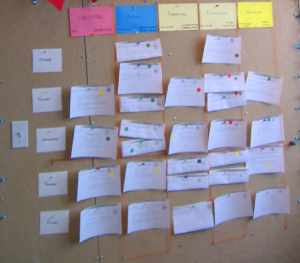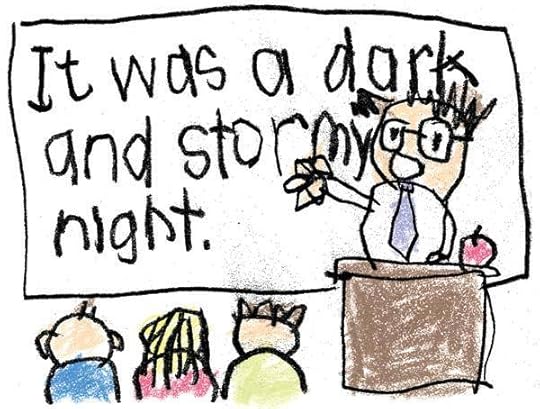T.S. Sharp's Blog, page 9
December 5, 2011
Work in Progress Extract
Here's an extract from the first chapter of my new novel, the one I'm working on in the creative writing course. I've got a pretty good idea where the novel is going, but I've only written about 6,000 words so far. As far as genre is concerned, I'd pigeon-hole this as crime fiction, or a noir police thriller (not sure that last one is an actual genre, but you get the idea). This is a random grab from Chapter 1;
~
Mitchell slotted the Glock back into the waistband at the small of his back and pulled the man upright, pushing him against the side of the car. The man had brown hair, shot through with grey, combed into a rough left-to-right side parting. He was wearing sensible black trousers and beneath his waterproof Gortex jacket he was wearing a navy blue sweatshirt which held back a moderate sized paunch. He was soft and rounded, the edges smoothed by a loving family and a comfortable suburban life. This was someone unfamiliar with acts of extreme violence. He reached into the man's jacket and retrieved his wallet, flipped it open and pulled out his driving licence. Mitchell memorised the details and shoved it back into the man's pocket.
"This is what you're going to do, Brian Whitaker, you're going to drive away. This never happened. The police will call you soon, they'll have you on CCTV leaving the car park minutes after the shooting. You'll be the prime suspect. Just tell them you took the stairs to this floor. As you drove away you heard what might have been gunshots, but you weren't sure. Got it?"
The man nodded.
"Stick to that story. If you deviate, or tell other people about this or me, I'll come after you and your family."
The two of them stared at each other, faces centimetres apart, both breathing hard. Mitchell let go of him and stepped back, an unmistakeable signal that the conversation was over, the man's life had been spared. He watched the man's clumsy fumbling at the door handle followed by the multiple attempts to slot the key into the ignition. The Ford lurched forward, sped down the centre of the car park and down the ramp, wheels squealing as he disappeared out of view.








December 1, 2011
Creative Writing Course – Week #7
 Week 7 is the penultimate class for this term, meaning the first chapter of our novels have to be submitted next week!
Week 7 is the penultimate class for this term, meaning the first chapter of our novels have to be submitted next week!
A segment of my opening chapter was read aloud to the class by the tutor this week, along with several other people's work. I felt it went down well, with a few helpful pointers given by the group, some of which I've incorporated into the passage. Everyone submitted their opening chapters last week for the tutor to read over and make suggestions, so we got them back this week with comments. More of that later.
Once we'd heard everyone's work and offered our opinions and constructive criticisms, we turned our attention to things to avoid when writing. This was in part to do with things the tutor had seen in our work. I'll briefly list them here:
Adverbs – Use adverbs sparingly. See what I did there? Words that end in 'ly' are adverbs, and make for lazy writing. Think of another way to make your point. They're not to be avoided entirely, but overuse is the mark of an amateur. I checked my work for them and I think I just about escape that pitfall!
Clarity – You need to ensure you don't lose your reader. If the reader has to drop out of the text to work out what you're trying to say, you've lost them for good. It's an easy mistake to make, for the writer always knows what he/she is trying to show, but it doesn't necessarily translate to the reader.
Location – This is especially important for the opening of a piece of work. Your reader has to have an impression of where your story is set, to give it a sense of place. This applies to country, region, town and right down to room level. If this can be dropped into the chapter at a very early stage – all the better.
Point of View – First Person, Second Person, or 3rd Person – these are the main forms stories are told in. Getting this right and consistently keeping it correct throughout a novel is often hard, but it's essential. I'm going for 3rd Person Omniscient for my novel. Must keep an eye on getting and keeping it right.
Natural Dialogue – Bad or unnatural dialogue will break the reality of a story for the reader, and it's strange how something we all engage in every day can be hard to perfect.
Repetition – Be careful not to overuse words in close proximity to each other. This can often be solved by reading the work aloud, but even then a writer might miss them. Best to get someone else to read through your work and highlight any issues. The only exception to this rule is when it's for a distinct stylistic purpose, but that should be obvious to the reader.
Back to the feedback on our work. About half a dozen of us had our work read out by the tutor, the rest had theirs read out in the previous week. There was some really good writing, a variety of styles and genres, and hearing them being read by the same voice was very useful.
We all offered our support and constructive criticisms, all of which was noted down by the authors for attention at a later date. One thing I noticed is that most of the points raised were often things that had gone totally unnoticed or not previously considered by the writer, myself included. Readers, or listeners in this instance, pick up on totally different strands of the writing than the writer will. They appreciate certain word usages and descriptions you hadn't given much thought to, all testament to how useful having a room full of people to listening to your work is.
Having read through the tutors comments on my work so far, I made a few amendments and took on board some of the issues he'd raised, all very useful. The hard part is carrying on in the same vein for the rest of the novel, but it's all good practice.
The tutor made the point about my work that the hitman/contract killer genre had been done to death and that editors/agents/publishers don't want to see them. This comment comes after the reading of my first chapter on its own, without any of the subsequent chapters. Firstly, I'm not concerned by this because ultimately the story is not about hitmen or contract killers. The tutor is not to know, of course, he's only read about 1,500 words. It's about an undercover policeman who plays both side of the game when working with drug dealers. OK, so I might be guilty of writing in another 'done to death' (pun alert) genre, but just not the one he thinks;)
At the end of the class, I realised I need a title for my novel. My plan was to write it and then come up with something fitting when I had more of a feel for the piece, but of course it has to have a title for the submission of the first chapter. I realise that the title is not totally binding at this point, in theory literally any title will do, it can be changed later, but I'm still pondering it. I have until next Wednesday to come up with something. I have a placeholder title at the moment, so I think I'll stick to that right now until I can think of something.
I'll let you know what I decide next week.








November 28, 2011
Plotting (my own downfall)
 The writing course I am attending has forced me to think seriously about plotting out the events for my latest writing project. You might think that's stating the obvious, or ask why would you be trying to write a novel without having spent time working out the plot etc?
The writing course I am attending has forced me to think seriously about plotting out the events for my latest writing project. You might think that's stating the obvious, or ask why would you be trying to write a novel without having spent time working out the plot etc?
The only feeble excuse I can offer is that while I had ideas for a new novel, I hadn't really got beyond the pondering stage, but I then took my ideas to the course to use as a framework for a novel, whereupon I realised part of the course requirements were to develop and submit a synopsis.
I have the first four chapters of the novel written, subject to a total re-write at any moment of course, but I realised that during the course of the classes I am bound to be asked about details of the novel which I haven't given much/any thought. So I sat down and tried to work out the what my characters were trying to achieve and how they were going to do it.
To start off with, all I had was a bunch of unconnected scenes and snatches of dialogue and a rough through-line. Somehow I needed to interlink them into a meaningful narrative. I'm not sure if the task was made harder by the fact that I am planning to write a crime/noir/ thriller novel, so the plot and all its interdependent strands have to reach a neat or at least satisfying ending.
In a previous attempt to get my head around the plot, or lack of, I tried to talk it through with my wife. That didn't help, to be honest. At the end of it I'm not sure who was the more confused, me or her. I've also found that once you give serious thought to the plot developments, it interferes with previous ideas or renders previously written chapters irrelevant, but this all part of the maddening yet exciting writing process.
On that note, if anyone has interesting and helpful suggestions of how you approach the plotting of a novel, I'd be interested to hear it.
PS: the photo is not mine, I found that on google images, but that's kind of what I'd do if I was organised!








November 25, 2011
Creative Writing Course – Week #6
 Most of this week's class was spent listening to excerpts from classmates' first chapters, read by the tutor. Hearing the various styles from across the group is fascinating, and each piece was offered constructive feedback from both the tutor and everyone else.
Most of this week's class was spent listening to excerpts from classmates' first chapters, read by the tutor. Hearing the various styles from across the group is fascinating, and each piece was offered constructive feedback from both the tutor and everyone else.
Two hours is not long enough to spend discussing the dark art of creative writing, so the class is often wound up before everyone has a chance to have their work shared, and I was one of those who will get that honour next week. More time to endlessly insert, edit and then remove words here and there in the eternal pursuit of the perfect paragraph.
There's only a couple of weeks until the end of the term, whereby we'll have to submit our first chapter. Mine is already written, but it might need a few hundred words added to increase the word count a little. It's currently at around 1,550 words, the upper limit suggestion being around the 2,000 mark. We have to send our first chapters to the tutor this week for his comments to be returned to us next week, so I'll be working on mine again over the next couple of days.
We spent the second half of the class discussing the issue of formatting, looking at fonts, spacing, sizes, indenting and all the other industry criteria used when submitting work to publishers etc. Like a lot of the things covered in the course, some of it I knew, and some of it was entirely new to me, so all very interesting and valuable.
Like I already mentioned, a two hour class is not enough time to discuss creative writing, especially when you have fifteen or so people with various levels of experience and very different approaches to the craft. Time flies by and I can appreciate how hard it is to keep to a structured lesson plan when you a have a room full of people who want to discuss their projects and ask questions etc. Last week email addresses were exchanged, so hopefully we'll start to critique work between us and share our thoughts.
Enough of this, back to editing my (supposedly already finished) first chapter…!








November 17, 2011
Creative Writing Course – Week #5
 The next few weeks of the course are to be lead by another tutor, one who has written and published several books, so is pretty well versed in the writing process. The course has a half theory, half practical approach, which seems well suited to learning the craft.
The next few weeks of the course are to be lead by another tutor, one who has written and published several books, so is pretty well versed in the writing process. The course has a half theory, half practical approach, which seems well suited to learning the craft.
The first half of this week's course was spent giving our thoughts about the course so far. The feedback was mostly positive, with a few suggestions about maybe having some writing exercises or group work during some of the class time, but I can see how this would be difficult given the two hour length of the class. Two hours flies by when you have fifteen or so people talking about books and writing, so keeping a structured approach to each session must be quite hard.
This week there was some discussion of the 'Writer Vs Planner' approach to writing. Some people are writers, in that they just sit down and spill out their thoughts without any structural notes or plans, and let the story and characters form organically. Others are planners, those who methodically make notes and lists and charts about plot and characters and locations etc, so that it's all laid out before them before they commit pen to paper for chapter one. The group seemed to have a slightly higher proportion of planners from what I could tell.
I, I think, am a cross between the two. I find I have to write a scene if it's nagging at me or has just come to me in a flash of inspiration, even if I'm not sure where it fits into the narrative. I can work this out later. This would put me in the 'writer' camp. But on the other hand, in order to work out why something has happened, I often find myself having to plan the plot out, so that I can see the progression of the storyline. I often make a list of character traits, which incidentally, was last weeks homework task, and this would put me in the 'planner' camp. So, just to be contrary, I think I am neither one nor the other. But at the end of the day, a writer has to do whatever works for them.
The first term of the course is aimed at producing the opening chapter of our novels, which is to be handed in in the next three weeks. Better get editing. In fact, I have to add a little more wordcount, as mine is a little on the light side at approx. 1,600 words. To get an idea of the kind of techniques and approaches found in opening chapters, and opening paragraphs of opening chapters, we looked at four extracts from published books. Without knowing the title and writer, we discussed our feelings about what we'd heard. This is where a creative writing course becomes interesting, in much the same way a book club does, there's usually a consensus in the group about the atmosphere and genre of the writing. These kind of responses are the type of things a writer wants to elicit from a reader. Of course, it could have gone the other way if the four openings weren't well received.
In general the opening chapter should do the following things:
Introduce the main character(s)
Set the scene/location
Establish a tone
Ask the reader a question which is only partly answered
Of course, the 'rules' of writing are amorphous and ill-defined, but these principles should give us some guidance. You can take away and add more as you see fit.
The task for next week is more reading out of our work. This time it will be a passage selected from wherever we want within our first chapters, to be read by the tutor so as to give the work the same 'voice'. I can see this is going to cause me to pore over my work before then, to find a section worthy of being delivered to 15 or so critics. I might well end up changing or adding in whole new sections. There's no better test than having your work read out, though.
Are you a writer or a planner? Notes or instinct? Research or diving straight in? Are you a mix of both, like me? I'm interested to see how others do it.








November 10, 2011
Creative Writing Course – Week #4
 "A million reasons to quit, only one reason to keep going."
"A million reasons to quit, only one reason to keep going."
This was a comment made by the tutor last night in relation to the discipline of writing a novel, and it's so true. This week focused on the importance of the physical act of writing, getting words down on the screen/page. Once the bulk of your narrative starts to emerge, you can return to edit and correct it, but without that, you have nothing.
There are a multitude of distractions which can beset a writer, and some of them are writing related. One of them is the enormous choice of words available to you, vocabulary can serve to constrict the writer's work as well as expand it. Spending time searching for the perfect word to use in a sentence when working on the first or second draft of something can waste a lot of time, only to see you changing it back anyway. Your first instinct is often the correct one.
The three terms of the course are to be spent looking at the creation and honing of the first three chapters of a novel. Term one is the first chapter, term two is the second chapter, etc. For the first chapter of a novel, it's essential for the writer to discover his or her voice, which will give essence to your work, making it sound the way you want it to.
I've already written the first four chapters of my new novel, and I read the opening couple of paragraphs from the first chapter out loud to the class last week. I'm pleased to see that the immediate, punchy pace I wanted to achieve was picked up on by the class and tutor, so hopefully I have gone some way to finding the appropriate 'voice' for this project.
The homework for this week is to complete a full biography for your protagonist. I've done this kind of thing before, but always in a really sketchy form without any real depth. We were told to look at everything that might influence the character's behaviour in our writing, from their birth to the present day. By considering every aspect of the protagonist's life, a deeper understanding of them should emerge for the writer. We were also warned that this can often throw up issues and story elements the writer had not previously considered. This in turn can steer the novel in a direction not previously intended. This is not necessarily a bad thing, and it will be interesting to see where this leads me.
I can see that one thing I might need to tease out as an integral character trait for my protagonist is the possibility of a dark past, ghosts that haunt him and play out in the actions and reactions of his story.
Who knows where this exercise will lead me? I know I certainly need to examine my main character some more before I commit many more words to the story, so I'm sure it will all help.
The bad news in terms of the 'one million reasons to quit…' thing is that I plan to get a copy of Modern Warfare 3 for the Xbox this weekend, and coupled with Battlefield 3, I can see a lot of time being sunk into video games as opposed to writing!








November 3, 2011
Creative Writing Course – Week #3
 I am no longer a reading virgin.
I am no longer a reading virgin.
I read the opening paragraph or so from my first chapter to the rest of the class last night, and it seemed to go down very well. I was given a couple of pointers as to suggested word replacements, but other than that I escaped any major criticisms. The course tutor asked for the full chapter to read through, which I presume I'll get feedback on next week or so. I'm looking forward to that, although it's pretty much in first draft condition at the moment.
The two questions posed last week – 'What single thing has bugged you most in your adult life?' and 'What has most positively absorbed you?' were tackled this week. My answers were 'negativity' and 'films/tv/music' respectively. I won't run through the answers given by the rest of the class, but they were similar to mine. The idea behind exploring these questions was that the emotions evoked by them should be channelled into your writing. If you are passionate about something – use that energy in your work. Similarly, if you are annoyed or incensed by something, use it. 'Your anger is a gift', to quote Rage Against The Machine. Wow – never thought I'd be quoting them in a blog!
The underlying message here is to aim to be able to write as passionately and enthusiastically as you can talk about a subject. A good principle, I'll try and employ it, hopefully without descending into a 100,000 word rant.
Homework for this week? A scene breakdown of your first chapter. Using the headings:
Location
Characters
Action
Justification
This is intended to make us look at the construction of our work, breaking it down into bare components. We're also being asked to look at our protagonist, and examine what their normal life is like and then consider what events change his or her life.
This is a relatively straightforward task, so shouldn't take too long to complete, but it should help to better inform us about our characters and the construction of their world.
I might also do some more work on progressing the writing I have already done, and pushing it past the 4 or so chapters I have so far. That is, unless Battlefield 3 arrives for the Xbox in the next couple of days, hotly pursued by Modern Warfare 3, which will both steal all my spare time!
PS – who is the phantom blog commenter from the course who left me message here recently? Short of asking the whole class who 'Hijinx' is, I'm still in the dark…
 [image error]
[image error]

 [image error]
[image error]



Creative Writing Course – #3
I am no longer a reading virgin.
I read the opening paragraph or so from my first chapter to the rest of the class last night, and it seemed to go down very well. I was given a couple of pointers as to suggested word replacements, but other than that I escaped any major criticisms. The course tutor asked for the full chapter to read through, which I presume I'll get feedback on next week or so. I'm looking forward to that, although it's pretty much in first draft condition at the moment.
The two questions posed last week – 'What single thing has bugged you most in your adult life?' and 'What has most positively absorbed you?' were tackled this week. My answers were 'negativity' and 'films/tv/music' respectively. I won't run through the answers given by the rest of the class, but they were similar to mine. The idea behind exploring these questions was that the emotions evoked by them should be channelled into your writing. If you are passionate about something – use that energy in your work. Similarly, if you are annoyed or incensed by something, use it. 'Your anger is a gift', to quote Rage Against The Machine. Wow – never thought I'd be quoting them in a blog!
The underlying message here is to aim to be able to write as passionately and enthusiastically as you can talk about a subject. A good principle, I'll try and employ it, hopefully without descending into a 100,000 word rant.
Homework for this week? A scene breakdown of your first chapter. Using the headings:
Location
Characters
Action
Justification
This is intended to make us look at the construction of our work, breaking it down into bare components. We're also being asked to look at our protagonist, and examine what their normal life is like and then consider what events change his or her life.
This is a relatively straightforward task, so shouldn't take too long to complete, but it should help to better inform us about our characters and the construction of their world.
I might also do some more work on progressing the writing I have already done, and pushing it past the 4 or so chapters I have so far. That is, unless Battlefield 3 arrives for the Xbox in the next couple of days, hotly pursued by Modern Warfare 3, which will both steal all my spare time!
 [image error]
[image error]

 [image error]
[image error]



October 27, 2011
Creative Writing Course – Week #2
 Last night was the second week of the Novel Writing course I've started this term. Some of the session was spent re-capping from last week, a section was spent discussing the various points of origin for story ideas, and the rest was devoted to hearing how people had got on with the task from last week – write the first paragraph of a first chapter.
Last night was the second week of the Novel Writing course I've started this term. Some of the session was spent re-capping from last week, a section was spent discussing the various points of origin for story ideas, and the rest was devoted to hearing how people had got on with the task from last week – write the first paragraph of a first chapter.
There was some discussion of the strange phenomena that a lot of writers suffer from – inspiration and ideas coming to you when you are least able to propogate them. This happens a lot at the point of falling asleep. When your mind is disengaging from all the minutiae of your every day life, creative ideas and concepts present themselves to you. Wake yourself up to write them down and you won't be able to go back to sleep. Go to sleep and you'll probably lose those ideas forever. I'm glad I'm not the only one who suffers from this.
As this term is going to be focused on the opening chapter of a novel, the session covered the structural forms of a first chapter. This can be broken down into looking at the chapter it terms of its constituent parts – Where/Who/What/Why. The idea being that we should apply this formula to the opening chapter. The same concept can be used to look at the whole novel too.
I've already written the first four chapters of the novel I am working on now, and I was pleased to see that a lot of the ideas covered can be applied neatly to my opening chapter. The tutor told us to think of our first chapter as having its own start, middle and end, almost like a very short story. The rest of the novel then expands and explores the elements uncovered at the beginning. I can already see that my opening chapter is going to go through dozens of edits before the course is finished, but I am relieved to find it does cover a lof of the bases. Phew.
Several of the class read their opening paragraphs out, which were then given feedback by the fourteen or so other attendees. I am still a reading-virgin, as the class came to an end before I got to read mine, so I'll be doing that next week. It's a strangely daunting task, reading your writing out to a room full of strangers for them to praise/destroy, but I'm sure once I've done it it will be fine.
I really enjoyed hearing other people read their work, especially as it was all of a very high standard. There was a variety of styles and genres and it was clear that the class is made up of people who are already quite accomplished writers. This is very different to the previous course I attended, where work would be read out which was either poor or very rough, and an embarassing silence would descend on the room as no one wanted to say what we all thought. What they'll make of my opening paragraph remains to be seen, but I'm looking forward to the points of view and suggestions that the class make about it.
Feedback from virtual strangers is invaluable. They'll almost always pick up elements and themes you either haven't noticed yourself or didn't consciously intend to be there. And of course they'll suggest ways you can economise on narrative or strengthen characters or plot. Over the course of a 25 week course, it seems we'll all become quite familiar with each other's work, and get to see it develop and flourish.
Between now and next week's class, I have to ponder the question posed to us by the tutor:
'What single thing has bugged you most in your adult life?'
That's quite a question, and I am as yet unsure of how I'll answer it!
 [image error]
[image error]
 [image error]
[image error]
[image error]
[image error]

 [image error]
[image error]
October 20, 2011
Creative Writing Course – Week #1.
 I started a 25 week creative writing course run at the university where I work, and last night was the first night. My intention is to post a blog after each weekly session – we'll see if I can deliver them or not!
I started a 25 week creative writing course run at the university where I work, and last night was the first night. My intention is to post a blog after each weekly session – we'll see if I can deliver them or not!
The aim of the course is to develop the first three chapters and the synopsis of a novel, as well as deconstructing the novel and demystifying the writing process. This course, 'Creative Writing: Novel writing', is co-taught by a writer of several published novels and short stories, and a Film & Media Studies/Creative Writing lecturer, so between them they seem to have the knowledge and experience to run a very rewarding course.
I've been to a writing course before at the university, but this one is a lot more substantial than the previous one. That was little more than a group of people meeting to discuss books and writing, and while it was interesting, it was not very productive. Also, the guy running the course would say stuff like:
'Dickens, you say? I'll have to check him out, he sounds interesting…'
(OK, I'm exaggerating slightly there, but he did say something like that about a household name writer whom he had never heard of). Another gem was:
'…after 10 years of writing (and not being published) I've recently discovered that characters are really important when trying to write a novel…'
A writing course run by a guy who never reads books is definitely one to avoid.
The people attending the course seemed to be a 50/50 mix of those that had written a novel or short stories (like myself) and those that wanted to embark on it after years of false starts.
The first session was mostly introductions and talking about our writing backgrounds and what we hoped to get from the course. We also talked about the books we'd read recently and our impressions of them.
We were even set homework, a task to be completed for next week with a view to discussing the ideas we had developed from the week before. I'm a little ahead of the game here in this respect, in that the first 8 week term is going to be focused on creating the opening chapter of a novel, and I have already written the first four of my new novel. I'll be spending the time revisiting what I already have, rather than trying to build from scratch, but I'm sure it will all be a valuable exercise.
I really enjoyed the first class, so I look forward to the rest. One of the best things about attending things like this is listening to what other people have to say about books and writers, as well as hearing their work. You also get feedback from a variety of people, which is invaluable, as having your work exposed to a range of readers gives you access to critique you wouldn't otherwise get.
The course will provide feedback and assessment from the tutors, and all work is marked and eventually assessed for grading and certification, so all in all it's a professionally run course with what I hope will be a productive outcome.
Next week I'll post a round-up of the week's class, and let you know how I got on with the task set this week.

 [image error]
[image error]








